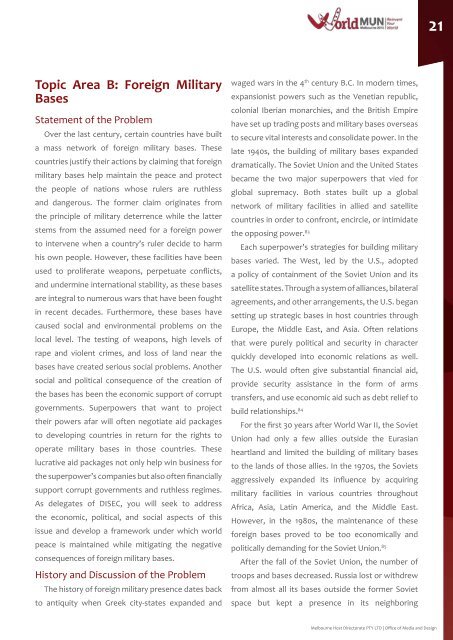Disarmament and International Security Committee (DISEC)World ...
Disarmament and International Security Committee (DISEC)World ...
Disarmament and International Security Committee (DISEC)World ...
Create successful ePaper yourself
Turn your PDF publications into a flip-book with our unique Google optimized e-Paper software.
Topic Area B: Foreign Military<br />
Bases<br />
Statement of the Problem<br />
Over the last century, certain countries have built<br />
a mass network of foreign military bases. These<br />
countries justify their actions by claiming that foreign<br />
military bases help maintain the peace <strong>and</strong> protect<br />
the people of nations whose rulers are ruthless<br />
<strong>and</strong> dangerous. the former claim originates from<br />
the principle of military deterrence while the latter<br />
stems from the assumed need for a foreign power<br />
to intervene when a country’s ruler decide to harm<br />
his own people. However, these facilities have been<br />
used to proliferate weapons, perpetuate conflicts,<br />
<strong>and</strong> undermine international stability, as these bases<br />
are integral to numerous wars that have been fought<br />
in recent decades. Furthermore, these bases have<br />
caused social <strong>and</strong> environmental problems on the<br />
local level. The testing of weapons, high levels of<br />
rape <strong>and</strong> violent crimes, <strong>and</strong> loss of l<strong>and</strong> near the<br />
bases have created serious social problems. Another<br />
social <strong>and</strong> political consequence of the creation of<br />
the bases has been the economic support of corrupt<br />
governments. Superpowers that want to project<br />
their powers afar will often negotiate aid packages<br />
to developing countries in return for the rights to<br />
operate military bases in those countries. These<br />
lucrative aid packages not only help win business for<br />
the superpower’s companies but also often financially<br />
support corrupt governments <strong>and</strong> ruthless regimes.<br />
As delegates of <strong>DISEC</strong>, you will seek to address<br />
the economic, political, <strong>and</strong> social aspects of this<br />
issue <strong>and</strong> develop a framework under which world<br />
peace is maintained while mitigating the negative<br />
consequences of foreign military bases.<br />
History <strong>and</strong> Discussion of the Problem<br />
The history of foreign military presence dates back<br />
to antiquity when Greek city-states exp<strong>and</strong>ed <strong>and</strong><br />
waged wars in the 4th century B.C. in modern times,<br />
expansionist powers such as the Venetian republic,<br />
colonial Iberian monarchies, <strong>and</strong> the British Empire<br />
have set up trading posts <strong>and</strong> military bases overseas<br />
to secure vital interests <strong>and</strong> consolidate power. In the<br />
late 1940s, the building of military bases exp<strong>and</strong>ed<br />
dramatically. The Soviet Union <strong>and</strong> the United States<br />
became the two major superpowers that vied for<br />
global supremacy. Both states built up a global<br />
network of military facilities in allied <strong>and</strong> satellite<br />
countries in order to confront, encircle, or intimidate<br />
the opposing power. 83<br />
Each superpower’s strategies for building military<br />
bases varied. The West, led by the U.S., adopted<br />
a policy of containment of the Soviet Union <strong>and</strong> its<br />
satellite states. Through a system of alliances, bilateral<br />
agreements, <strong>and</strong> other arrangements, the U.S. began<br />
setting up strategic bases in host countries through<br />
europe, the Middle east, <strong>and</strong> Asia. Often relations<br />
that were purely political <strong>and</strong> security in character<br />
quickly developed into economic relations as well.<br />
The U.S. would often give substantial financial aid,<br />
provide security assistance in the form of arms<br />
transfers, <strong>and</strong> use economic aid such as debt relief to<br />
build relationships. 84<br />
For the first 30 years after <strong>World</strong> War II, the Soviet<br />
union had only a few allies outside the eurasian<br />
heartl<strong>and</strong> <strong>and</strong> limited the building of military bases<br />
to the l<strong>and</strong>s of those allies. In the 1970s, the Soviets<br />
aggressively exp<strong>and</strong>ed its influence by acquiring<br />
military facilities in various countries throughout<br />
Africa, Asia, Latin America, <strong>and</strong> the Middle east.<br />
However, in the 1980s, the maintenance of these<br />
foreign bases proved to be too economically <strong>and</strong><br />
politically dem<strong>and</strong>ing for the Soviet Union. 85<br />
After the fall of the Soviet Union, the number of<br />
troops <strong>and</strong> bases decreased. Russia lost or withdrew<br />
from almost all its bases outside the former Soviet<br />
space but kept a presence in its neighboring<br />
21<br />
Melbourne Host Directorate PTY LTD | Office of Media <strong>and</strong> Design
















